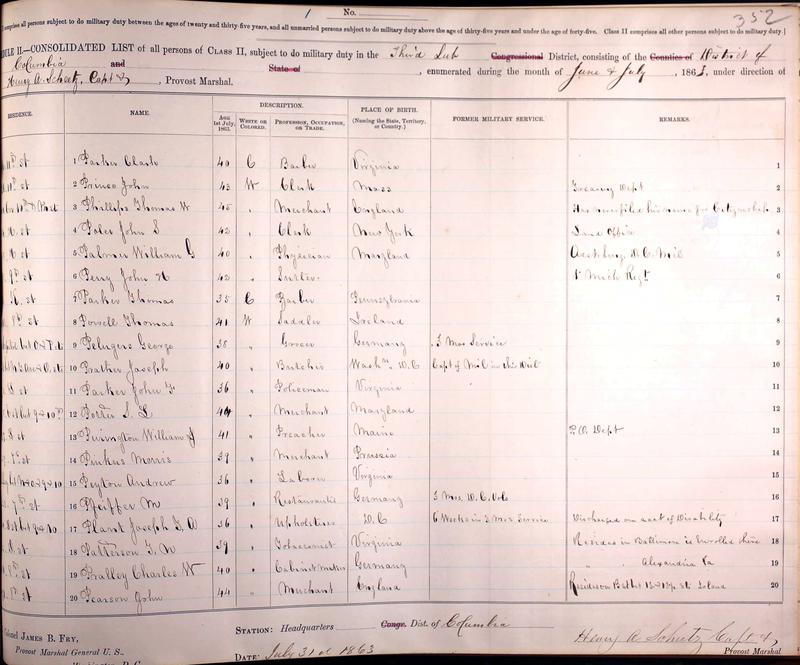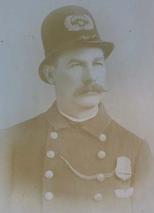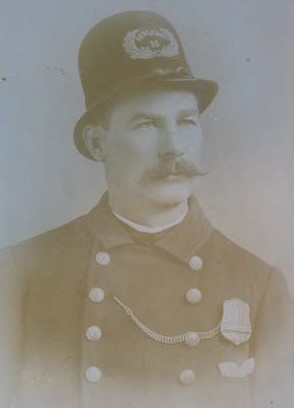WHO WAS PRIVATE PARKER ?
WHO WAS PRIVATE PARKER ?
The Mysterious Private Parker ... Was he involved, a pawn or there by chance ???
Washington D.C. Metropolitan Police
SOME INCIDENTS IN THE CAREER OF OFFICER JOHN F. PARKER, PRESIDENT LINCOLN’S BODY GUARD ON THE NIGHT OF THE ASSASSINATION; & HENRY P. CATTELL, THE MAN WHO EMBALMED LINCOLN’S BODY, AND WHO LATER BECAME A D.C. POLICE OFFICER AND SAVED THE LIFE OF THE SECRETARY OF THE NAVY DURING A HOUSE FIRE.
John F. Parker: The Guard Who Abandoned His Post
One of the many unsolved mysteries regarding Abraham Lincoln's assassination is the story of John F. Parker. Parker, a member of Washington's Metropolitan Police Force, was assigned as Mr. Lincoln's bodyguard the night of the shooting. However, Parker's chair outside the State Box at Ford's Theatre was vacant most of the evening. Nowadays, leaving the president unguarded is unconscionable, but in 1865 Parker was never punished for neglect of duty. In fact, for a time, he remained on as a White House guard. He kept his position as a Washington police officer until 1868 when he was fired for a totally unrelated reason. What is known of this man who abandoned his post on the night of April 14, 1865?
John Frederick Parker was born May 19, 1830, in Winchester, Virginia. His father was a butcher who later became a police officer. As time passed John moved to Washington, D.C. and became a carpenter. He married Mary America Maus on July 16, 1855, became the father of three children named Cora, Sallie, and Kate, and lived at 570 L Street N., Washington, D.C. When the Metropolitan Police Force was organized in 1861, he became one of its first 150 officers.
Parker's record as a police officer was spotty. Over the next few years he appeared before the Police Board for several transgressions. These charges included conduct unbecoming an officer, visiting a house of prostitution, firing a pistol through a window, being drunk on duty, being asleep on duty**, and using abusive and insulting language. At times he was reprimanded; at other times the charges were dismissed; at no time was he fired. Despite this record, Parker was one of four officers who became presidential guards on November 3, 1864.
On the night of April 14, 1865, Parker reported to the White House at 7:00 P.M. (three hours late). He was told to go to Ford's Theatre and wait for the president's party to arrive. After the Lincolns and their guests arrived and were seated, Parker took a seat just outside the State Box.
From this spot he could only hear the play; he soon left his post and found a better seat. At the intermission of Our American Cousin, Charles Forbes (Lincoln's footman) and Parker invited Francis P. Burke (Lincoln's coachman) to join them for a drink at the saloon next to Ford's Theatre. Whether Parker ever returned to the theater that night is unknown for certain. When John Wilkes Booth entered the State Box, Parker was either still in the saloon or back at his seat from which he could both see and hear the play.
The next known event regarding Officer Parker took place at 6:00 A.M. the next morning. He arrived at the police station with a woman named Lizzie Williams. She was immediately released although he wanted her charged with prostitution.
On May 1, 1865, Parker was charged with neglect of duty. The actual citation read in part:
"In this, that Said Parker was detailed to attend and protect the President Mr. Lincoln, that while the President was at Ford's Theatre on the night of the 14 of April last, Said Parker allowed a man to enter the President's private Box and Shoot the President."
Parker was tried on May 3rd, but no transcripts of the case exist. Washington newspapers did not cover the case. All that is known is that the complaint was dismissed on June 2nd.
One of Lincoln's other bodyguards, William H. Crook, said of Parker: "Had he done his duty, I believe President Lincoln would not have been murdered by Booth. Parker knew he had failed in duty. He looked like a convicted criminal the next day. He was never the same man afterward."
Parker remained on the police force until 1868. Finally, he was fired on August 13th of that year for sleeping on duty. He claimed he had been ill. In future years he found work as a carpenter and machinist. He died in Washington on June 28, 1890, of pneumonia, complicated by asthma and exhaustion. He was buried beside his children in Glenwood Cemetery in Washington. Parker's wife died on January 1, 1904, and was buried in the same lot. The graves are unmarked. There are Parker descendants living in the Washington area today, but they do not have the Parker name and have no pictures or family records of John F. Parker.
Obviously this is a mysterious case. On 13 previous visits to the theater, Lincoln was without any security at all. Some professionals have suggested Parker was serving more as an escort than a guard. Also, some historians and authors have logically suggested that Abraham Lincoln, with his known lackadaisicalness for personal safety, told Parker to leave his post and find a seat where he could see the play.
If this were true, Mary Todd Lincoln was apparently unaware of it. Mrs. Lincoln was reported to have orally taken Parker (who possibly was a relative of hers) to task one evening at the White House. According to Elizabeth Keckley Mrs. Lincoln was overheard blaming him for her husband's murder. Soon after the assassination Parker was the guard assigned to protect Mrs. Lincoln one night. She yelled at him, "So you are on guard tonight - on guard in the White House after helping to murder the president." Parker replied, "Pardon me, but I did not help to murder the president... I could never stoop to murder - much less to the murder of so good and great a man as the president." Mrs. Lincoln indicated she didn't believe him. Parker then continued, "I did wrong, I admit, and have bitterly repented... I did not believe any one would try to kill so good a man in such a public place, and the belief made me careless. I was attracted by the play, and did not see the assassin enter the box." Mrs. Lincoln told him she would always believe he was guilty and with a wave of her hand, she motioned for him to leave the room
**Parker was charged with being asleep on a streetcar during the hours that he should have been out walking his beat. However, the charge was dismissed when Parker said that he and another officer (whose name was Williams) had heard ducks squawking and had entered the streetcar to see what all the fuss was about.
*** Source: pp. 110-111 of Mary Lincoln's Dressmaker: Elizabeth Keckley's Remarkable Rise from Slave to White House Confidante by Becky Rutberg.
NOTE: In the fall of 1864 it was decided that a detail of the Washington Metropolitan Police force would be assigned to protect the president. This was at the request of Ward Hill Lamon, United States Marshall for the District of Columbia and a close friend of Lincoln's. Lamon had become increasingly fearful for the president's life. On November 3, 1864, the initial detail was composed of John R. Cronin, Alphonso Dunn (or Donn), Thomas F. Pendel, and Alexander (or Andrew) C. Smith. Changes were occasionally made, although the detail was never more than 5 officers at any one time. Other officers who served in the detail included William S. Lewis, William H. Crook, George W. McElfresh, Thomas T. Hurdle, Joseph Shelton, John F. Parker, and D. Hopkins. Parker was assigned to the detail sometime between late February and early April 1865. SOURCE: "The Mystery of Lincoln's Guard" by James O. Hall in the May 1982 issue of the Surratt Society News, and "Lincoln's Missing Guard" by Frederick Hatch in the April 2006 edition of the Journal of the Lincoln Assassination.
Additional sources used include A. Lincoln: His Last 24 Hours by W. Emerson Reck and Why Was Lincoln Murdered by Otto Eisenschiml. Also, thank you to Dr. Edward Steers for informing me of the number of Mr. Lincoln's previous visits to Ford's.
For added information, please see the article entitled "Mr. Lincoln’s Security" by Deborah Carbaugh in the August 2000 edition of the Surratt Courier. Another good source of information on Parker is Charles S. Clark's article entitled "American Biography: John Frederick Parker" in the April 2005 edition of American History magazine.
MR LINCOLN’S WHITE HOUSE - John Parker
John Parker was the Presidential bodyguard who arrived late to work on the night of April 14, 1865 and left to go to Ford's Theater after the President. He was a carpenter and machinist before serving briefly in the Army at the beginning of the Civil War. As a Washington policeman, he had compiled a record of misconduct and 14 disciplinary infractions that made him a curious choice for the White House detail. He once explained a week he spent in a house of prostitution by saying he had been protecting the establishment.
An order was sent to the Metropolitan Police Force on April 3 at the request of Mrs. Lincoln: "This is to certify John F. Parker, a member of the Metropolitan Police Force, has been detailed for duty at the Executive Mansion."1 His desertion of his post outside the Presidential box and neglect of duty at Ford's Theater led to charges against him, which were subsequently dropped. Fellow bodyguard William Crook reported: "Had he [Booth] found a man at the door of the of the President's box armed with a Colt's revolver, his alcohol courage might have evaporated. It makes me feel rather bitter when I remember that the President had said, just a few hours before, that he knew he could trust all his guards. And then to think that in that moment of test one of us should have failed him! Parker knew that he had failed in his duty. He looked like a convicted criminal the next day. He was never the same afterward."2
Had Parker "done his duty, I believe President Lincoln would not have been murdered by Booth," William Crook. "It was the custom for the guard who accompanied the President to the theatre to remain in the little passageway outside the box—that passageway through which Booth entered. Mr. Buckingham, who was the doorkeeper at Ford's Theatre, remembers that a chair was placed there for the guard on the evening of the 14th. Whether Parker occupied it at all I do not know—Mr. Buckingham is of the impression that he did. If he did, he left it almost immediately; for he confessed to me the next day that he went to a seat at the front of the first gallery, so that he could see the play. The door of the President's box was shut; probably Mr. Lincoln never knew that the guard had left his post."3
Footnotes
. James McPherson, Battle Chronicles of the Civil War, 1865, p. 75.
. W. Emerson Reck, Abraham Lincoln: His Last 24 Hours, p. 164-165.
. Margarita Spalding Gerry, editor, Through Five Administrations: Reminiscences of Colonel William H. Crook, p. 73-74.
******************************************************************************
WASHINGTON POST ARTICLE DATED JUNE 29, 1890, PAGE 3
DEATH OF MR. JOHN F. PARKER
Mr. John F. Parker, who was one of the first members of the Metropolitan police of this city, but of late years has not been connected with the force, died yesterday morning at 1 o’clock at his residence, 816 sixth street northwest. The funeral will be this afternoon at the house at 3:30 o’clock, religious services being conducted by Rev. Dr. Domer, after which Harmony Lodge No. 17, F.A.A.M., will take charge of the remains and escort them to Glenwood Cemetery, where interment will be made with Masonic honors.
******************************************************************************
WASHINGTON POST ARTICLE DATED JUNE 30, 1890, PAGE 2
WITH MASONIC HONORS A LARGE ATTENDANCE ON THE FUNERAL OF JOHN F. PARKER
The funeral of John F. Parker took place yesterday afternoon at 4:30 o’clock from his late residence, No. 816 Sixth street northwest. The services at the house were conducted by Rev. Dr. Domer and Chaplain L.H. Yorke officiated at the grave. Harmony Lodge, No. 17, Free and Accepted Masons, officered by W. Hamilton Smith, worshipful master; L.R. Ginn, senior warden; F. McC. Criswell, junior warden; O.S. Firmin, secretary, and L.D. Carmen, treasurer, escorted the remains to Glenwood Cemetery, where the interment was made. Brother Samuel Baxter was master of ceremonies and marshaled the forty members who were present.
A sheaf of wheat and a beautiful bunch of cut flowers with the deceased Mason’s apron, were placed upon the casket. The pallbearers were A.P. Myers, George E. Taylor, John A. Mitchell, J.K. Harris, George W. Harrington, and Joshua Stone.
At the grave the Masonic quartette sang “De Profoundis,” “Abide with Me,” “Master Mason’s Chant,” and “Nearer My God, to Thee.”
John Frederick Parker was born at Winchester, Frederick County, Va., in 1829, and learned the trade of a machinist. At the breaking out of the war he enlisted and served a short time. Just before the war ended, he was appointed on the police force of this city and was on duty at the box door of Ford’s Theater on the night that President Lincoln was assassinated. Of late years he worked at his trade in the navy yard. He leaves a widow and two married daughters, Mrs. Keyworth and Mrs. Nalley.
The above information was provided to me by John Daly who received it from Dave Richardson
So, who is John F. Parker ? Not much is known about him of his involvement or lack of involvement, in the assassination of President Lincoln. He was an unlikely Private with the M.P.D.C. to have been assigned to the White House at the time of President Lincolns Presidency. Unlikely because of his very blemished background with the M.P.D.C. Others have suggested that he was put there to be hidden or dumped. I can't see that either not with his background and the responsibility of the position.
Is it possible that he was put there BECAUSE of his poor ability to do his job ? In hope that some damage may come to the White House. Politics are politics and were not much different today then back then. Either way the manner of his actions before during and after the assassination of President Lincoln SHOULD, have drawn a great deal of attention to him, but it wasn't.
I am trying to gather what ever I can on Private Parker and putting it on here for you to review and come to your own conclusion. I hope you enjoy the readings.
Chuck Gallagher
Why is there not one photograph of Private Parker, not one ??
NOT EVEN A PRECINCT PICTURE ??
His personal file is nowhere to be found.
There are no known transcripts of his trial.
He came to the station the next day like nothing happened, no questions asked.
He was not mentioned the night of, one would think the first thing a supervisor would ask would be, where was his bodyguard, get me his bodyguard !
Why was his funeral so well attended?
Why has no one ever written about him?
I KNOW TIMES WERE DIFFERENT BACK THEN, But still.....




